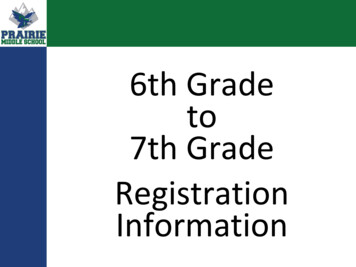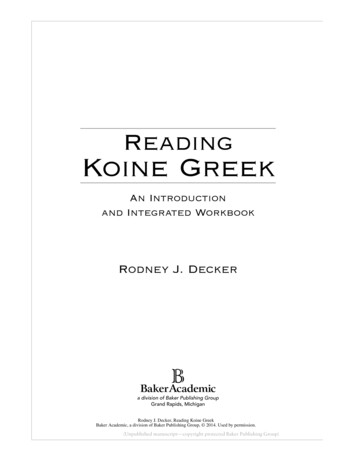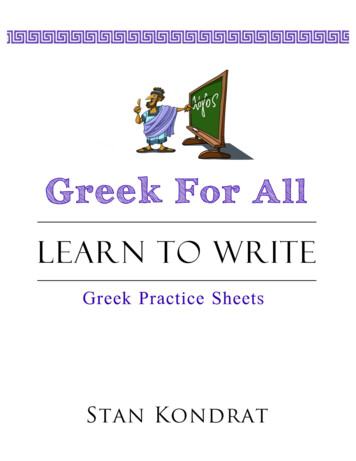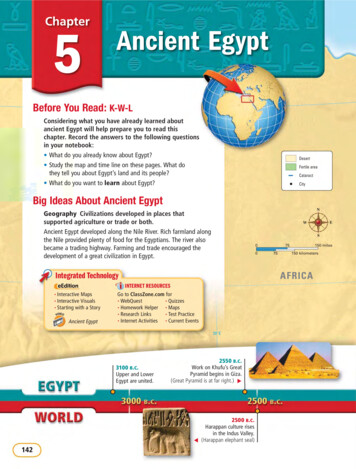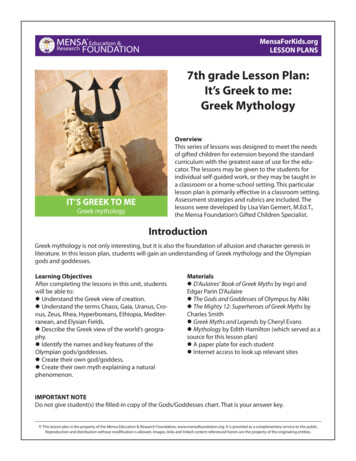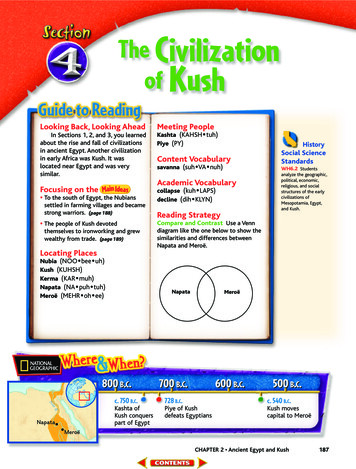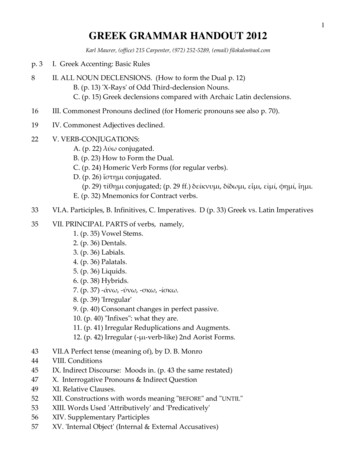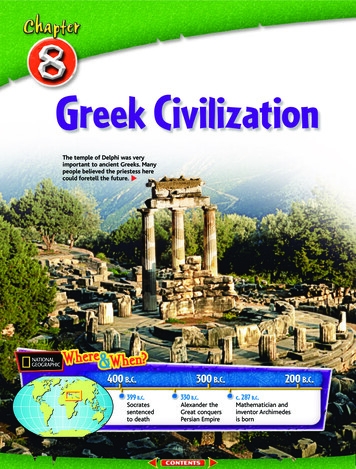
Transcription
Greek CivilizationThe temple of Delphi was veryimportant to ancient Greeks. Manypeople believed the priestess herecould foretell the future.400 B.C.300 B.C.200 B.C.399 B.C.330 B.C.c. 287 B.C.Socratessentencedto deathAlexander theGreat conquersPersian EmpireMathematician andinventor Archimedesis born
Chapter Overview Visitca.hss.glencoe.com for apreview of Chapter 8.The Culture of Ancient GreeceStudying the past helps us to understand the present. The Greeks madegreat strides in the arts. Greek poetry, art, and drama are still partof our world today.Greek Philosophy and HistoryCivilizations are strengthened by a variety of advances. The Greeks’love of wisdom led to the study of history, politics, biology, and logic.Alexander the GreatConflict often brings about great change. Alexander the Great was only25 years old when he conquered the Persian Empire. As a result ofhis conquests, Greek art, ideas, language, and architecture spreadthroughout southwest Asia and North Africa.The Spread of Greek CultureAs different societies interact, they often bring about change in eachother. Greek cities became centers of learning and culture. Greekscientists developed advanced ideas about astronomy and mathematics.View the Chapter 8 video in the Glencoe Video Program.Organizing Information Make the following foldable to help you organizeinformation about Greek culture and philosophy.Step 1 Fold two sheets of paperin half from top to bottom.Fold bothsheets to leave12 inch tabon top.Step 2 Place glue1or tape along both ——2inch tabs.Alexanderthe GreatStep 3 Fit bothsheets of papertogether to makea cube as shown.The Spreadof GreekCultureStep 4 Turn thecube and label thefoldable as shown.Reading and WritingAs you read the chapter,list the developmentsthat occurred in ancientGreece. Write thedevelopments under thecorrect foldablecategory.kTheeeCultureof Gr ilohyPAncientphGreece so373
VisualizingAuthors use descriptive language to help readers create pictures of people, places, or events in their minds. Authors also usewords to describe feelings or emotions to make the text come aliveto the reader. Good readers visualize by forming mental images ofthe text as they read to help them understand.As you read, you can visualize more easily by thinking of yourfive senses: sight, sound, touch, smell, and taste. Imagine how thetext descriptions look, sound, feel, smell, or taste.Read the following passage and answer the questions that follow.The Greeks believed that the godsand goddesses controlled nature.According to Greek myth, the godZeus ruled the sky and threw lightning bolts, the goddess Demetermade the crops grow, and the godPoseidon caused earthquakes.— from page 377lpg will he fornizilauVishe inember tmeruoead.yat you rhtnoitma Which of the gods or goddesses above can you bestvisualize? Why? How do you picture them in your mind? Which of your senses most actively help you visualize each description above?
Read the following paragraph. Notice how the authoruses the present tense to draw you into the story. Use theunderlined details to make a picture in your mind as youread.The battle for Troy drags on for 10 years.Finally, the Greeks come up with a plan to capture the city. They build a huge, hollow, woodenhorse. The best Mycenaean warriors hide insidethe horse.The Trojans, thinking the horse was a giftfrom the Greeks, celebrate and roll the gianthorse into the city. That night, the Greek warriors quietly climb from the horse and capturethe city.—from pages 379–380Read to WriteVisualizing can helpyou organizeinformation before youwrite it down,especially when usinggraphic organizers.Choose five Greekwriters from thechapter. Then create atable that shows theirfamous works.HomerAfter you visualize what this event might have lookedlike, check the picture on page 379. How closely does it match yourmental picture? Now reread the passage and lookat the picture again. Did yourideas change? What other words would you useto describe the picture? Compare your image with whatothers in your class visualized.Discuss how your mental picturediffered from theirs.As you read the chapter, list threesubjects or events that you were ableto visualize. Then make a roughsketch or drawing showing how youpicture these descriptions.Alinari/Art Resource, NY375
The Culture ofAncient GreeceHistorySocial ScienceStandardsWH6.4 Studentsanalyze the geographic,political, economic,religious, and socialstructures of the earlycivilizations of AncientGreece.Looking Back, Looking AheadLocating PlacesYou have read that under Pericles,Athens became a center of beautyand culture. During this Golden Age,Greek thinkers, writers, and artistscontributed many new ideas to theworld.Mount Olympus (uh LIHM puhs)Delphi (DEHL FY)Focusing on the The Greeks believed that gods andgoddesses controlled nature andshaped their lives. (page 377) Greek poetry and fables taught Greekvalues. (page 379)ment today. (page 382) Greek art and architecture expressedGreek ideas of beauty and harmony.Meeting PeopleHomer (HOH muhr)Aesop (EE SAHP)Sophocles (SAH fuh KLEEZ)Euripides (yu RIH puh DEEZ)700 B.C.GREECEAthensOlympia376myth (MIHTH)oracle (AWR uh kuhl)epic (EH pihk)fable (FAY buhl)drama (DRAH muh)tragedy (TRA juh dee)comedy (KAH muh dee)Academic Vocabulary Greek drama still shapes entertain-(page 384)Content Vocabularygrantgeneration (JEH nuh RAY shuhn)tradition (truh DIH shuhn)conflict (KAHN FLIHKT)Reading StrategyCompare and Contrast Create aVenn diagram showing similarities anddifferences between epics and fables.Epic600 B.C.BothFable500 B.C.c. 700s B.C.c. 550 B.C.Homer writes theIliad and OdysseyAesop writes Greek architectsa series ofbegin using marblefablescolumnsCHAPTER 8 Greek Civilizationc. 500s B.C.
WH6.4.4 Explain the significance of Greek mythology to the everyday life of people in the region and how Greek literature(cw from top)Bettman/CORBIS, The Art Archive/National Archaeological Museum Athens/Dagli Orti, The Art Archive/Achaeological Museum Tarquina/Dagli Orti, Lauros/Giraudon/Bridgeman Art Library, Lauros/Giraudon/Bridgeman Art Library,The Art Archive/Archaeological Museum Venice/Dagli Orti, Fitzwilliam Museum, University of Cambridge, UK/Bridgeman Art Library, Giraudon/Bridgeman Art Library, Peter Willi/Bridgeman Art Library, Wolfgang Kaehler/CORBIScontinues to permeate our literature and language today, drawing from Greek mythology and epics, such as Homer's Iliadand Odyssey, and from Aesop's Fables.Greek MythologyThe Greeks believed that gods andgoddesses controlled nature and shaped their lives.Reading Connection Have you ever wondered whycrops grow or why the sun rises and sets? To get theanswer, you would read a science book. Read to learnhow the Greeks used religion to explain nature.Myths (MIHTHS) are traditional storiesabout gods and heroes. Greek mythologyexpressed the Greek people’s religious beliefs.The Greeks believed in many gods and goddesses. They believed gods and goddessesaffected people’s lives and shaped events.That is why the most impressive buildings inGreek cities were religious temples.The Greeks believed their gods and goddesseswere a large family—all related in some way.1. Who was the twin sister of Apollo?2. Explain How were Ares and Zeus related?Greek Gods and Goddesses The Greeksbelieved that the gods and goddessescontrolled nature. According to Greekmyth, the god Zeus ruled the sky andthrew lightning bolts, the goddessDemeter made the crops grow, and thegod Poseidon caused earthquakes.The 12 most important gods andgoddesses lived on Mount Olympus(uh LIHM puhs), the highest mountainin Greece. Among the 12 were Zeus,who was the chief god; Athena, thegoddess of wisdom and crafts; Apollo,the god of the sun and poetry; Ares, thegod of war; Aphrodite, the goddess oflove; and Poseidon, the god of the seasand earthquakes.
The Greeks also believed in an afterlife.When people died, the Greeks believed theirspirits went to a gloomy world beneath theearth ruled by a god named Hades.What Was a Greek Oracle?This painting shows a Greek man at the oracleat Delphi receiving a prophecy. Why were theseprophecies often confusing?But Greek gods and goddesses were notthought to be all-powerful. According toGreek myths, even though gods had specialpowers, they looked like human beings andacted like them. They married, had children,quarreled, played tricks on each other, andfought wars.Because Greeks sought their gods’ favor,they followed many rituals. A ritual is a set ofactions carried out in a fixed way. As part oftheir rituals, the Greeks prayed to their godsand also gave them gifts. In return, theyhoped that the gods would grant goodfortune to them. Many Greek festivals honored the gods and goddesses. Festivals dedicated to Zeus were held at Olympia.378Mary Evans Picture LibraryCHAPTER 8 Greek CivilizationThe Greeksbelieved that each person had a fate or destiny. They believed that certain events weregoing to happen no matter what they did.They also believed in prophecy. A prophecyis a prediction about the future. The Greeksbelieved that the gods gave prophecies topeople to warn them about the future intime to change it.To find out about the future, manyGreeks visited an oracle (AWR uh kuhl).This was a sacred shrine where a priest orpriestess spoke for a god or goddess. Themost famous was the oracle at the Templeof Apollo at Delphi (DEHL FY). The oraclechamber was deep inside the temple. Theroom had an opening in the floor where volcanic smoke hissed from a crack in the earth.A priestess sat on a tripod—a threelegged stool—in the oracle chamber and listened to questions. The priests translatedher answers. State leaders or their messengers traveled to Delphi to ask advice fromthe oracle of Apollo.The priestess in the oracle often gaveanswers in riddles. When one king, namedCroesus (KREE suhs), sent messengers to theoracle at Delphi, they asked if the kingshould go to war with the Persians. The oracle replied that if Croesus attacked thePersians, he would destroy a mighty empire.Overjoyed to hear these words, Croesusdeclared war on the Persians. The Persianarmy crushed his army. The mighty empireKing Croesus had destroyed was his own!Explain Why did theGreeks have rituals and festivals for their godsand goddesses?
WH6.4.4 Explain the significance of Greek mythology to the everyday life of people in the region and how Greek literaturecontinues to permeate our literature and language today, drawing from Greek mythology and epics, such as Homer's Iliadand Odyssey, and from Aesop's Fables.Greek Poetry and FablesGreek poetry and fables taught Greekvalues.Reading Connection Do you have favorite stories?Are the characters in the stories brave and clever? Read aboutthe characters of the best-loved stories in early Greece.Greek poems and stories are some ofthe oldest in Europe. For hundreds ofyears, Europeans and Americans haveused these early works as models for theirown poems and stories. Shakespeare, forexample, borrowed many Greek plots andsettings.The earliest Greek stories were epics(EH pihks). These long poems told aboutThe Trojan HorseAfter building the Trojanhorse, the Greeks returnedto their ships and pretendedto retreat. Despite warnings,the Trojans brought thehorse within their city asa war trophy. The Greeksinside the horse opened thecity gates for their fellowsoldiers and captured thecity. What epic included thestory of the Trojan horse?Clay carving of theTrojan horseJames L. Stanfield/National Geographic Society Image Collectionheroic deeds. The first great epics of earlyGreece were the Iliad and the Odyssey. Thepoet Homer (HOH muhr) wrote these epicsduring the 700s B.C. He based them on stories of a war between Greece and the city ofTroy, which once existed in the region thatis today northwestern Turkey.In the Iliad, a prince of Troy kidnaps thewife of the king of Sparta. The kidnappingoutrages the Greeks. The king of Mycenaeand the brother of the king of Sparta leadthe Greeks in an attack on Troy.The battle for Troy drags on for10 years. Finally, the Greeks come up witha plan to capture the city. They build ahuge, hollow, wooden horse. The best Mycenaean warriors hide inside the horse.
into a good man . . . [so] he compelled meto memorize all of Homer.”Homer’s stories promoted courage andhonor. They also taught that it was important to be loyal to your friends and to valuethe relationship between husband andwife. The stories showed heroes striving tobe the best they could be. Heroes fought toprotect their own honor and their family’shonor. Homer’s heroes became role modelsfor Greek boys.AesopWho Was Aesop?According to legend, Aesop was freedfrom slavery and became an adviser toGreek rulers. What is a fable?The Trojans, thinking the horse was agift from the Greeks, celebrate and roll thegiant horse into the city. That night, theGreek warriors quietly climb from thehorse and capture the city.The Odyssey tells the story of Odysseus,another Greek hero. It describes his journeyhome from the Trojan War. Odysseus facesstorms, witches, and giants before returning to his wife. Because it took Odysseus 10years to get home, we use the word odysseytoday to mean a long journey with manyadventures.Greeks believed the Iliad and theOdyssey were more than stories. Theylooked on the epics as real history. Thesepoems gave the Greeks an ideal past witha cast of heroes. Generations of Greeksread Homer’s works. One Athenian wrote,“My father was anxious to see me develop380Alinari/Art Resource, NYCHAPTER 8 Greek CivilizationAbout 550 B.C., a Greekslave named Aesop (EE SAHP) made up hisnow famous fables. A fable (FAY buhl) is ashort tale that teaches a lesson. In most ofAesop’s fables, animals talk and act likepeople. These often funny stories exposehuman flaws as well as strengths. Eachfable ends with a message, or moral.One of the best-known fables is “TheTortoise and the Hare.” In this fable, a tortoise and a hare decide to race. More thanhalfway into the race, the hare is way ahead.He stops to rest and falls asleep. Meanwhile,the tortoise keeps going at a slow but steadypace and finally wins the race.The moral of the story is “slow andsteady wins the race.” Some of the phraseswe hear today came from Aesop’s fables.“Sour grapes,” “a wolf in sheep’s clothing,”and “appearances often are deceiving” areexamples.For about 200 years, Aesop’s fableswere a part of Greece’s oral tradition. Thismeans they were passed from person toperson by word of mouth long before theywere ever written down. Since then, countless writers have retold the stories in manydifferent languages.Describe What are thecharacteristics of a fable?
6.4.6. Compare and contrast life in AthensWH6.4.4Explainthe significanceof GreekandSparta, withemphasison their rulesinmythologyto theeveryday lifeWars.of people inthePersian andPeloponnesianthe region and how Greek literaturecontinues to permeate our literature andlanguage today, drawing from Greekmythology and epics, such as Homer's Iliadand Odyssey, and from Aesop's Fables.HOMERc. 750 B.C.HomerHomer’s epic poems—the Iliad and theOdyssey—are famous, but until the 1900s, historiansbelieved that Homer never existed. Historians nowknow Homer was a real person, but they still debatewhether he wrote his poems alone or with the helpof other poets.Many historians have speculated, or madeeducated guesses, about Homer’s personal life.Some say that Homer came from Ionia and sevencities claim to be his birthplace. Some believe thathe was blind. Others believe that he wanderedfrom town to town.Legends tell of Homer’s strong influence on hisreaders. For example, as a young child, Alexanderthe Great is said to have slept with a copy of theIliad under his pillow.Homer used the term aoidos for a poet. Thisword means “singer,” which tells us that the poetrycreated during Homer’s time was memorized andrecited, not written down. Usually, short, simplepoems that were easy to remember were told toan audience as entertainment.Homer created a different style of poetry thatinfluenced all Western literature that followed. His——Homer, the Iliadepics are long and involve complex characters,dramatic action, and interesting events. Becauseeach section of the Iliad and the Odyssey has thesecharacteristics, most historians today think thatonly one poet could have created bothepics. Whoever Homer was, his twoepics have influenced readers for nearlyReview the characteristics of an epic. Then do3,000 years.research to identify a modern epic.“I hate as I hate [Hades’]own gate that man whohides one thought withinhim while he speaksanother.”381Scala/Art Resource, NY
WH6.4.4 Explain the significance of Greek mythology to the everyday life of people in the region and how Greek literaturecontinues to permeate our literature and language today, drawing from Greek mythology and epics, such as Homer's Iliadand Odyssey, and from Aesop's Fables. WH6.4.8 Describe the enduring contributions of important Greek figures in the arts andsciences (e.g., Hypatia, Socrates, Plato, Aristotle, Euclid, Thucydides).Today’s movies, plays, and televisionshows are all examples of drama.Greek DramaGreek drama still shapes entertain-Tragedies and Comedies The Greeks performed plays in outdoor theaters as part oftheir religious festivals. They developed twokinds of dramas—comedies and tragedies.In a tragedy (TRA juh dee), a personstruggles to overcome difficulties but fails.As a result, the story has an unhappy ending. Early Greek tragedies presented peoplein a struggle against their fate. Later Greektragedies showed how a person’s characterflaws caused him or her to fail.ment today.Reading Connection Think about your favoritemovie. How would you describe it? Is it a tragedy? Isit a comedy? Read to find out how Greek plays stillinfluence our entertainment.What is drama (DRAH muh)? Drama is astory told by actors who pretend to becharacters in the story. In a drama, actorsspeak, show emotion, and imitate theactions of the characters they represent.The TheaterTragedies and comedies were staged at atheater on the slopes of the Acropolis in Athens.The plays included music and dance. Greekactors wore costumes and held large masks.The masks told the audience who theactor was supposed to be—a king, asoldier, or a god. All the actors weremen, even those playing female parts.A modern-day playActors today includeboth men and women—and evenchildren and animals. Special effectsand makeup have replaced handheldmasks. Music in modern theater issometimes just as important as the actors’words. If you watched a Greek play, what mightRuins of a Greek theater382CHAPTER 8 Greek Civilization(l)SuperStock, (r)Eric Robert/CORBISit tell you about life in ancient Greece?
In a comedy (KAH muh dee), the storyends happily. Today we use the word comedyto mean a story filled with humor. The wordactually means any drama that has a happyending.Greek stories dealt with big questions,such as: What is the nature of good and evil? What rights should people have? What role do gods play in our lives?The three best-known writers of Greektragedies were Aeschylus (EHS kuh luhs),Sophocles (SAH fuh KLEEZ), and Euripides(yu RIH puh DEEZ). The best-known writerof Greek comedies was Aristophanes (ar uh STAH fuh NEEZ).Early Greek tragedies had only one actorwho gave speeches and a chorus that sangsongs describing the events. Aeschylus wasthe first to introduce the idea of having twoactors. This let the writer tell a story involvingconflict between the two people. Aeschylusalso introduced costumes, props, and stagedecorations—all items we still use today.One of Aeschylus’s best-known playsis a group of three plays called the Oresteia(ohr eh STY uh). Aeschylus wrote theplays in 458 B.C. They describe what happens when the king of Mycenae returnshome from the Trojan War. The Oresteiateaches that evil acts cause more evil actsand suffering. In the end, however, reasontriumphs over evil. The moral of theseplays is that people should not seekrevenge.Sophocles, a general and a writer of plays,developed drama even further. He usedthree actors in his stories instead of one ortwo. He also placed painted scenes behindthe stage as a backdrop to the action. Two ofSophocles’ most famous plays are OedipusRex (EH duh puhs REHKS) and Antigone(an TIH guh nee). In Antigone, SophoclesThis artwork showsactors preparing fora play. When andwhere were Greekplays performed?Comedy andtragedy masksasks the question “Is it better to followorders or to do what is right?”Euripides, a later playwright, tried totake Greek drama beyond heroes and gods.His characters were more down-to-earth.Euripides’ plots show a great interest inreal-life situations. He questioned traditional thinking, especially about war. Heshowed war as cruel and women and children as its victims.The works of Aristophanes are goodexamples of comedies. They make fun ofleading politicians and scholars. Theyencourage the audience to think as well asto laugh. Many of Aristophanes’ playsincluded jokes, just like popular televisioncomedies do today.Summarize What twotypes of drama did the Greeks create?CHAPTER 8 Greek Civilization383(t)Erich Lessing/Art Resource, NY, (b)Mary Evans Picture Library
WH6.4.8 Describe the enduring contributions of important Greek figures in the arts and sciences (e.g., Hypatia, Socrates, Plato,Aristotle, Euclid, Thucydides).Greek Art and ArchitectureGreek art and architecture expressedGreek ideas of beauty and harmony.Reading Connection Do you consider any buildingin your neighborhood a work of art? Read on to findout about buildings that people have admired as artfor centuries.Artists in ancient Greece believed in certain ideas and tried to show those ideas intheir work. These ideas have never goneout of style. Greek artists wanted people tosee reason, moderation, balance, and harmony in their work. They hoped their artwould inspire people to base their lives onthese same ideas.We know that the Greeks paintedmurals, but none of them have survived.However, we can still see examples ofGreek painting on Greek pottery. The pictures on most Greek pottery are either redon a black background or black on a redbackground. Large vases often had scenesfrom Greek myths. Small drinking cupsshowed scenes from everyday life.The ParthenonStanding at almost 230 feet long and 100 feet wide,the Parthenon was the glory of ancient Athens. It wasbuilt between 447 and 432 B.C. What was the purposeof the Parthenon?DoricIonicCorinthianTreasure RoomHeld the city's goldThe Greeks used threedifferent styles of columnsin their buildings.AthenaThe statue of Athena,covered in ivory and gold,was about 43 feet high.FestivalAthenians came to honorAthena every four years.Today the Parthenon stillrises above Athens.384CHAPTER 8 Greek Civilization(tl)Joel W. Rogers/CORBIS, (tc)Dave Bartruff/CORBIS, (tr)Vanni Archive/CORBIS, (b)Charles O’Rear/CORBIS
In addition to making pottery, theGreeks were skilled architects. Architectureis the art of designing and building structures. In Greece, the most important architecture was the temple dedicated to a god orgoddess. The best-known example is theParthenon. Temples, such as the Parthenon,had a walled room in their centers. Statuesof gods and goddesses and the gifts offeredto them were kept in these central rooms.Large columns supported many Greekbuildings. The first Greek columns werecarved from wood. Then, in 500 B.C., theGreeks began to use marble. Marblecolumns were built in sections. Largeblocks of marble were chiseled from stonequarries and brought by oxen-drawnwagon to the building site. The sectionswere stacked on top of each other. To keepthem from toppling, the column’s sectionswere joined with wooden pegs. Today,marble columns are common features ofchurches and government buildings.Some of the best-known buildings in ournation’s capital, such as the White Houseand the Capitol, have Greek columns.Many Greek temples were decoratedwith sculpture. Greek sculpture, like Greekarchitecture, was used to express Greekideas. The favorite subject of Greek artistswas the human body. Greek sculptors didnot copy their subjects exactly, flaws andall. Instead, they tried to show their idealversion of perfection and beauty.Identify What wasthe most important type of building in Greece?Study Central Need help understandingGreek culture? Visit ca.hss.glencoe.com and clickon Study Central.Reading SummaryReview the The Greeks believed gods andgoddesses influenced their lives.They believed oracles spoke forthe gods and goddesses. The Greeks wrote long poems,called epics, and short tales, calledfables, to pass on Greek values. The Greeks created the ideas oftragedy and comedy that are stillused in drama today. Greek art forms, such as painting,architecture, and sculpture,expressed Greek ideas of beauty,harmony, and moderation.What Did You Learn?1. How and why did the Greekshonor their gods?2. What values did the epic poemsof Homer teach Greeks?Critical Thinking3.What are themain themes of Euripedes’plays? Would they be populartoday? CA 6RL3.64. Summarizing InformationDraw a table like the onebelow to describe the characteristics of Greek architectureand pottery. CA 6RC2.45. Contrast How do Greektragedies and comedies differ?CA 6RL3.16. Evaluate Why did Greekartists include the ideas of reason, moderation, balance, andharmony in their works?CA 6RC2.37. Expository Writing Greek literature tells us about Greeksociety. Choose a modern bookor movie. Write a paragraph toexplain what it would tell othersabout our society. CA 6WA2.2Visualizing8.Greek ArchitectureGreek PotteryWrite a description of Greekarchitecture. Give details soreaders can visualize them.CA 6RC2.4CHAPTER 8 Greek Civilization385
Retold by Geraldine McCaughreanBefore You ReadThe Scene: This story takes place on the Greek island of Crete in thelegendary time when both humans and gods lived in ancient Greece.The Characters: Daedalus is the master architect for King Minos of Crete.Icarus is the son of Daedalus.The Plot: King Minos summons Daedalus and Icarus to build him a palaceand then keeps them captive in their own creation. Daedalus plans toescape.Vocabulary Previewlabyrinth: an extremelycomplicated mazeluxurious: characterized by comfortor pleasureastonishment: sudden wonder orsurprisetaunt: to mock in an insultingmannerdaub: to cover with a sticky matterplume: a large and showy feather ofa birdHave you ever known someonewho ignored warnings and didsomething dangerous? This isthe story of a young boy whodoes not listen to his father andsuffers the consequences.386
As You ReadKeep in mind that a myth is a special kind of story, usuallyinvolving gods or goddesses. Greek myths, like this one, weretold and retold over many hundreds of years. Try to figure outwhy the Greeks told this story. What lesson does it teach? The island of Crete was ruled by King Minos,1whose reputationfor wickedness had spread to every shore. One day he summoned2to his country a famous inventor named Daedalus. “Come,3Daedalus, and bring your son Icarus, too. I have a job for you, andI pay well.”King Minos wanted Daedalus to build him a palace, with soaringtowers and a high, curving roof. In the cellars there was to be amaze of many corridors—so twisting and dark that any man whoonce ventured in there would never find his way out again.“What is it for?” asked Daedalus. “Is it a treasure vault? Is it aprison to hold criminals?”But Minos only replied, “Build my labyrinth as I told you. I payyou to build, not to ask questions.”So Daedalus held his tongue and set to work. When the palacewas finished, he looked at it with pride, for there was nowhere in theworld so fine. But when he found out the purpose of the maze in thecellar, he shuddered with horror.For at the heart of that maze, King Minos put a creature thatwas half man, half beast—a thing almost too horrible to describe.4He called it the Minotaur, and he fed it on men and women!Then Daedalus wanted to leave Crete at once, and forgetboth maze and Minotaur. So he went to King Minos to askfor his money.“I regret,” said King Minos, “I cannot let youleave Crete, Daedalus. You are the only man whoknows the secret of the maze and how to escapefrom it. The secret must never leave this island. SoI’m afraid I must keep you and Icarus here a whilelonger.”“How much longer?” gasped Daedalus.1King Minos: the king of CreteDaedalus (DEH duhl uhs): architect for King Minos3Icarus (IH kuh ruhs): son of Daedalus4Minotaur: the half man, half beast that lived in the king’spalace2387
“Oh—just until you die,” replied Minos cheerfully. “But never mind.I have plenty of work for a man as clever as you.”Daedalus and Icarus lived in great comfort in King Minos’s palace.But they lived the life of prisoners. Their rooms were in the tallestpalace tower, with beautiful views across the island. They atedelectable food and wore expensive clothes. But at night the door oftheir fine apartment was locked, and a guard stood outside. It was acomfortable prison, but it was a prison, even so. Daedalus was deeplyunhappy.Every day he put seed out on the windowsill, for the birds. He likedto study their brilliant colors, the clever overlapping of their feathers,the way they soared on the sea wind. It comforted him to think thatthey at least were free to come and go. The birds had only to spreadtheir wings and they could leave Crete behind them, whereas Daedalusand Icarus must stay forever in their luxurious cage.Young Icarus could not understand his father’s unhappiness. “But Ilike it here,” he said. “The king gives us gold and this tall tower to livein.”Daedalus groaned. “But to work for such a wicked man, Icarus!And to be prisoners all our days!.We shan’t stay. We shan’t!”“But we can’t get away, can we?” said Icarus. “How cananybody escape from an island? Fly?”
WH6.4.4 Explain the significance of Greek mythology to the everyday life of people in the region and how Greek literature continues to permeate our literature and language today, drawing from Greek mythology and epics, such as Homer's Iliad and Odyssey, and from Aesop's Fables. Greek Poetry and Fables Greek
